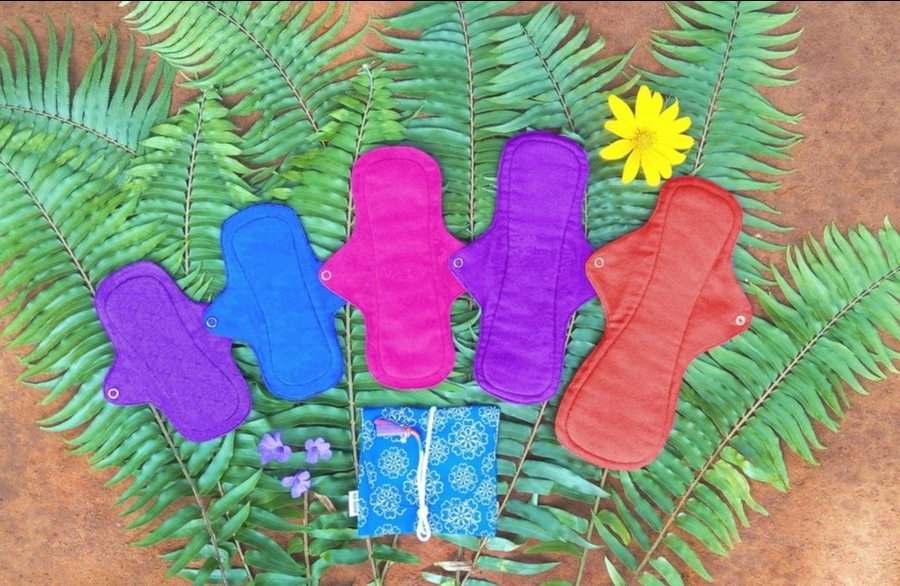
10 reasons to Green Your Periods
1 Apr 2016 | 5 min Read
Neha Chopra
Author | 12 Articles
Menstruation is the one red thread that is common to women all over the world.
Disposable pads are wasteful and leave a massive carbon footprint. Our bodies and the earth pay the hidden costs of using these synthetic, bleached toxic demons.
It’s time that we switch to sustainable and reusable menstrual solutions that truly respect our bodies and are eco-friendly too! The two available alternatives in India today are:
Reusable Cloth Pads are made from layers of absorbent, natural fabric that are worn to absorb the menstrual flow. They can be washed, dried and re-used.
Menstrual Cups are bell shaped flexible cup, made from medical grade silicone, worn inside the vagina, to collect menstrual fluid instead of absorbing it, hence making it convenient to clean and reuse.
Source: rusticart.in
Switch because…
Healthy: Reusable cloth pads are made from natural fabrics such as cotton, flannel, hemp etc. Fabric feels cool on skin, is breathable and does not cause any skin irritations as opposed to disposables that often cause foul smell, rashes or allergies. Tampons pose the risk of Toxic Shock Syndrome (TSS) because they dry out vaginal fluid while absorbing the menstrual blood. Menstrual cup on the other hand only collects blood inside the vagina, making it the most hygienic alternative! The raw materials (non-woven polymers, polyacrylate gel, plastics), usage of chlorine and fragrances in disposable pads can cause mild to severe health problems – dryness, fungal infections, cramping, contact dermatitis, and hormonal disorders.
Source: EcoFemme.org
Convenient: Advertisements brainwash us into believing that cloth-pads are dirty, old-fashioned and restrict movement. Innovative modern cloth pads can easily replace sanitary napkins as they come in various sizes (mini to maxi), are leak-proof with inserts or a PUL waterproof lining. Menstrual cup have an initial learning curve but they are truly liberating. Women with active lifestyle (sports, yoga, swimming) can use these effortlessly even during the first three heavy flow days.
Source: EcoFemme.org
Affordable: On an average, a woman uses 14-20 pads per cycle, in a year; spending 1500 to 2500 Rupees on purchasing disposables (10 Rupee per pad base rate). Reusable cloth pads range between 80 to 280 Rupees, if you invest in a decent stash of 10-12 pads, it can last up to 2 years, as they can be washed and reused. A menstrual cup ranges between 700 to 1200 Rupees and have a life span of 3-5 years if managed properly.
Disposable Pad Calculation: http://www.pleasurepuss.com/cl…
Source: rusticart.in
Eco-friendly: Disposables are non-biodegradable and burden our landfills. Women menstruate for 33-35 years (from the age of 11 to 45), ending up disposing about 8,000 to 11,000 pads in her lifetime. Multiply this by the total number of women in the world and the ecological footprint of our menstrual waste will baffle you. How can our symbol of fertility cause the mother earth to become sterile and threaten its very existence? Cloth pads and menstrual cups are reusable, last for years, doing away with so much wastage and damage.
Source: en.wikipedia.org
Sanitary: Cloth isn’t unhygienic! If you wash it well, dry in sun and store in a clean place, it is the most natural material touching your skin. Menstrual cups are low maintenance, they need to be rinsed between uses and sterilized between menstrual cycles.
Source: facebook.com/ugerpads
Aesthetic: Reusable cloth pads come in a variety of color, pattern and designs. They are thin and compact like their disposable counterparts, so it doesn’t feel bulky or bunch-up between the legs.
Source: facebook.com/JaioniReusablePads
Discreet: A wet bag is an economical, odorless, leak proof storage solution when working or travelling with cloth pads. Menstrual cups are by far, the most travel friendly solution for women on the go!
Dignity in Reuse: It’s easy to bundle up and toss away your disposable, to let someone else deal with your waste! However, by investing an extra 5 minutes a day (with menstrual cups) during your periods – you increase your environmental quotient manifold.
Promote Education & Livelihood: Woman from rural India and economically disadvantaged backgrounds often use rags to manage their menstruation. They dry their pads in damp-dark corners, thereby increasing risk of infections. Cloth pad manufacturers train and empower these women to stitch cloth-pads to generate supplementary income. They also educate them in menstrual hygiene through workshops. Remember, when you opt to purchase alternative menstrual products, another woman from lower economic group gets access to cross-subsidized reusable cloth pads.
Source: EcoFemme.org
Made in India: Manage your menstruation responsibly by opting for Indian brands such as EcoFemme’s cloth pads and SheCup, Jivika, Uger, Jaioni, Rustic Art’s menstrual cup and also look up initiatives such as Not Just a Piece of Cloth (NJPC) by Goonj, that create cloth pads out of old clothes collected from urban masses.
Source: EcoFemme.org
If you are a man reading this, share it with your wives, daughters, sisters, girlfriends and mothers. And, if you are a woman reading this, switch to informed choices and find your fit – wrapped in a cloth or happy in a cup!
Source: EcoFemme.org
References:
Brands – to buy :
- http://ecofemme.org
- https://planetjivika.wordpress…
- http://ugerpads.jimdo.com
- https://www.facebook.com/Jaion…
- http://www.rusticart.in/produc…
- http://njpc.goonj.org/napkin-m…
Source for banner image: EcoFemme.org
A


Suggestions offered by doctors on BabyChakra are of advisory nature i.e., for educational and informational purposes only. Content posted on, created for, or compiled by BabyChakra is not intended or designed to replace your doctor's independent judgment about any symptom, condition, or the appropriateness or risks of a procedure or treatment for a given person.
